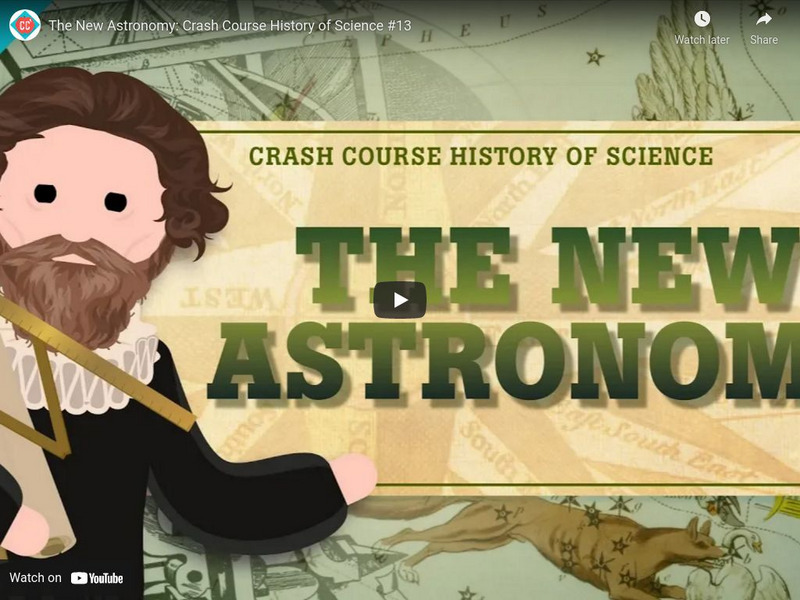PBS
The Truth About Beauty in Physics
The great physicist Hermann Weyl once said: "My work always tried to unite the true with the beautiful, but when I had to choose one or the other, I usually chose the beautiful." But is this actually good advice for doing physics?
3Blue1Brown
Feynman's Lost Lecture
This video recounts a lecture by Richard Feynman giving an elementary demonstration of why planets orbit in ellipses. See the excellent book by Judith and David Goodstein, "Feynman's lost lecture”, for the full story behind this lecture,...
Crash Course
Newton and Leibniz: Crash Course History of Science
The standard story of the Scientific Revolution culminates with the long life of one man: Sir Isaac Newton—a humble servant of the Royal Mint, two-time parliamentarian, and a scientific titan whose name, along with Einstein’s, is...
Flipping Physics
Kepler's Third Law Derivation
Kepler’s third law is derived and demonstrated. This is an AP Physics C: Mechanics topic. Content Times: 0:00 Kepler’s Third Law 0:34 Kepler’s Third Law Derivation 3:38 Satellite mass is irrelevant
Flipping Physics
Kepler's Second Law Derivation
Kepler’s second law is derived and demonstrated. This is an AP Physics C: Mechanics topic. Content Times: 0:00 Kepler’s Second Law 0:18 Angular Momentum Conservation 1:27 Planet Angular Momentum 2:21 Kepler’s Second Law Derivation 3:58...
Flipping Physics
Kepler's Third Law of Planetary Motion
Kepler’s third law is described and demonstrated. This is an AP Physics C: Mechanics topic. Content Times: 0:00 Kepler’s Third Law 1:55 Comparing Planetary Data 3:58 Graphing Planetary Data
Flipping Physics
Kepler's Second Law of Planetary Motion
Kepler’s second law is described and demonstrated. This is an AP Physics C: Mechanics topic. Content Times: 0:00 Kepler’s Second Law 1:27 Mild issues with the animation
Flipping Physics
Kepler's First Law of Planetary Motion
A brief history of geocentric and heliocentric solar system models are discussed. Kepler's first law is defined. How to draw an ellipse is demonstrated. Planet eccentricities are discussed. This is an AP Physics C: Mechanics topic....
Crash Course
Newton and Leibniz: Crash Course History of Science #17
The scientific revolution went out with a bang, thanks to some impressive intellectuals! Newton's and Leibniz's noteworthy discoveries unfold in the 17th installment in a lengthy History of Science series. Viewers witness the birth of...
Crash Course
The New Astronomy: Crash Course History of Science #13
Sword duels, religious unrest, war—who says science is boring? Aspiring astronomers discover fascinating facts about the famous scientists that dared challenge the accepted model of the solar system in the 13th video of a 16-part History...
Physics Girl
Everything You Should Know about Trappist-1 Exoplanets
Have we found the next Earth? Join the host of an interesting physics series as she learns what scientists know about the planets orbiting the star Trappist-1 during an engaging video. Astronomers discuss how they located the system,...
DoodleScience
Gravitational Fields
What's got you feeling down? Maybe it's gravity! The resource is the fourth in a series of six fast-paced physics videos. Covering gravitational fields, acceleration, and planetary motion in a direct way with simple, yet...
NASA
Science at Nasa: Science Casts: An Alignment of Planets
The brightest planets in the night sky were aligning for a must-see show in late February and March 2012. [3:32]
PBS
Pbs Learning Media: Crash Course Astronomy: Mars
The fourth planet from the sun and the outermost of the terrestrial planets, Mars has long been a popular spot for missions and imagination. Learn about the planet's topography, core, and features. We'll take a look back to Mars's past...
PBS
Pbs Learning Media: Crash Course Astronomy: Venus
Venus is a gorgeous naked-eye planet, hanging like a diamond in the twilight, but its beauty is best looked at from afar. Even though Mercury is closer to the sun, Venus is the hottest planet in the solar system due to a runaway...
PBS
Pbs Learning Media: Crash Course Astronomy: Saturn
Saturn is the crown jewel of the solar system, beautiful and fascinating. [12:12]
Crash Course
Crash Course History of Science #13: The New Astronomy
This is the story of Tycho Brahe and Johannes Kepler and the contributions they made to the field of Astronomy. They synthesized a lot of new, old, and bold astronomical ideas into a single sun-centered, eccentricity-positive system....
University of Oregon
Electronic Universe: Kepler's Laws of Planetary Motion
From the The Electronic Universe Project web site. This page states and explains Kepler's three laws of planetary motion. Includes some downloadable movie clips and associated sound files. Discusses Ptolemy's attempt to explain...
Mocomi & Anibrain Digital Technologies
Mocomi: Discovery of Planetary Motion
Discusses the work of Johannes Kepler and his Law of Ellipses.







